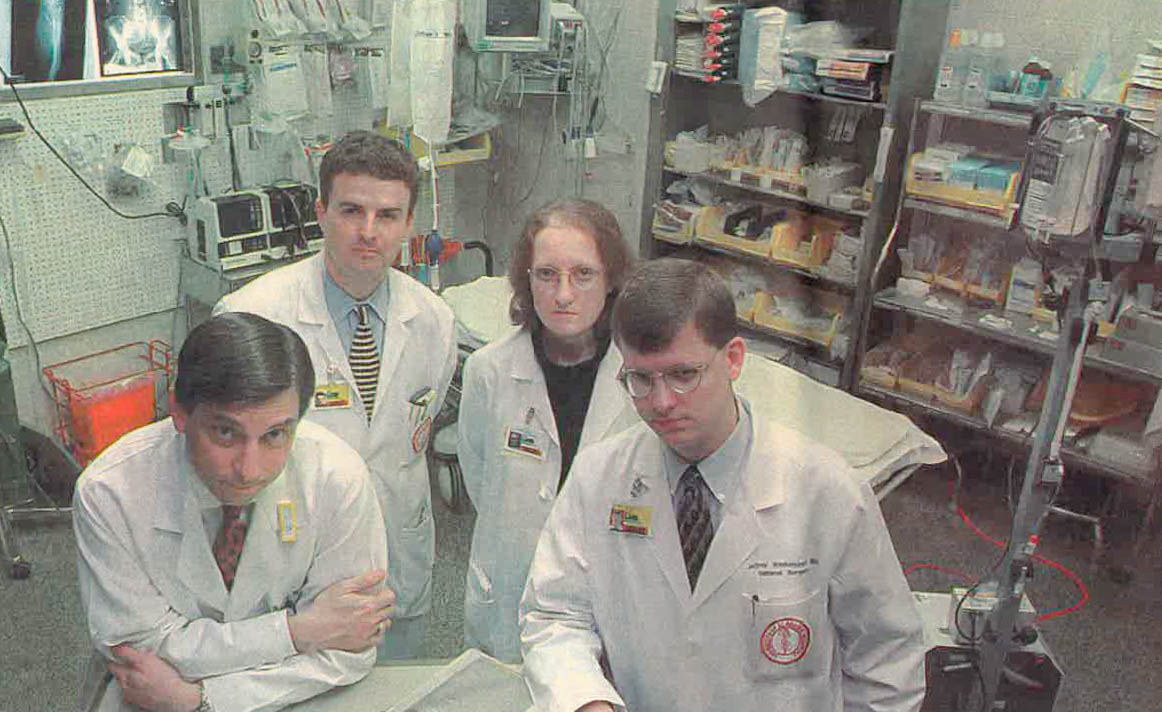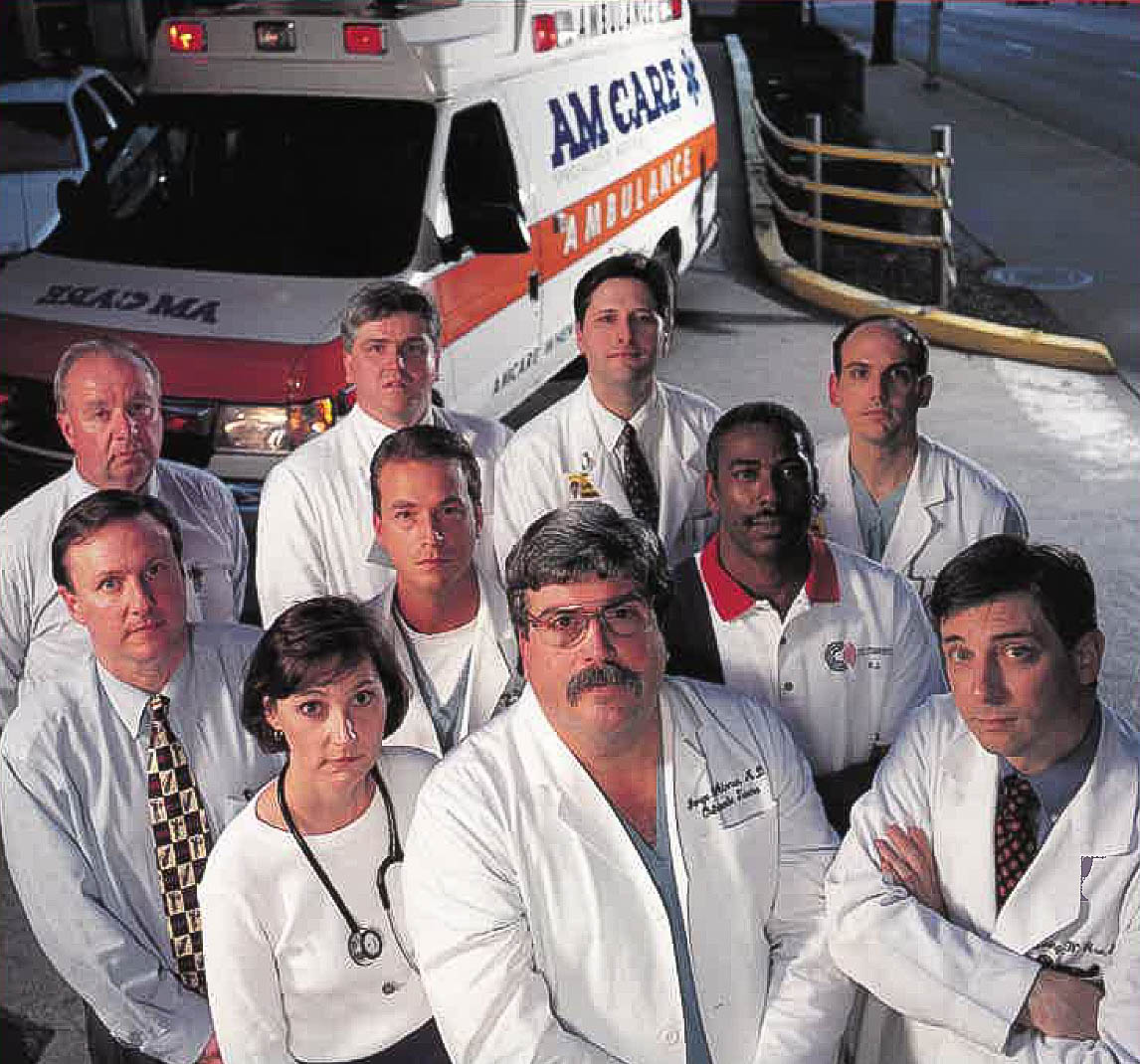 Loring Rue, M.D.The UAB Division of Trauma and Acute Care Surgery is pleased to announce a new endowed lectureship to honor the legacy of Loring W. Rue III, M.D., professor emeritus in the UAB Department of Surgery. Dr. Rue’s leadership and dedication to improving trauma care makes him an instrumental figure in the history of the trauma program at UAB.
Loring Rue, M.D.The UAB Division of Trauma and Acute Care Surgery is pleased to announce a new endowed lectureship to honor the legacy of Loring W. Rue III, M.D., professor emeritus in the UAB Department of Surgery. Dr. Rue’s leadership and dedication to improving trauma care makes him an instrumental figure in the history of the trauma program at UAB.
About Dr. Loring Rue
Dr. Rue received his medical degree from the University of Virginia and completed his residency in general surgery at UAB, training under Arnold G. Diethelm, M.D. He served in the U.S. Army and was a burn team leader during the 1991 Gulf War. After the Iraqi missile attacks on U.S. military barracks in Dhahran, Saudi Arabia, he was a part of a self-contained surgical unit that cared for and evacuated the wounded.
Following a term of distinguished military service in the Army, Dr. Rue returned to UAB in 1992. He served as director of the Division of Trauma and Acute Care Surgery for 19 years, as well as Chief of Trauma, Burns, and Surgical Critical Care services. His impact was felt far beyond the trauma bays and operating rooms - he led historic transformations in the way the state of Alabama cares for trauma patients.
Innovations in trauma care
For example, in 1996, Dr. Rue worked with Joe Acker, director of the Birmingham Regional Emergency Medical Services System (BREMSS), to form the Trauma Communication Center (TCC), a first-of-its-kind system which monitors trauma center capacity in real time and helps first responders route trauma patients to hospitals equipped to provide the right level of care for their specific injuries. This type of system is especially crucial for a state like Alabama with “trauma deserts” - rural pockets of the state with either no hospitals or hospitals that are not equipped to care for the most severely injured.
In its first year, the TCC had 10 hospitals participating voluntarily across six Alabama counties and had entered over 2,400 patients in the system.
Alabama was a pioneer of this type of system, and the TCC has served as a model for the rest of the country.
Just two years later, Alabama would face the first true test of the TCC.
On April 8, 1998, a tornado swept across Alabama, killing 34 people and injuring 200. At UAB alone, 30 patients arrived for care - 11 of them requiring emergency surgery. The TCC operated as designed, ultimately saving lives.
Dr. Loring Rue (far left), with a group of doctors who provided care after the Birmingham abortion clinic bombing in 1998. (The Birmingham Times)
In 2007, the TCC expanded to a statewide resource and has subsequently expanded to provide prehospital coordination and support for stroke patients, with the potential to also expand into urgent cardiac care coordination. The TCC now coordinates care for an average of 15,000 trauma patients each year.
Dr. Rue led the UAB trauma program through the process of verification by the American College of Surgeons (ACS) as a Level I trauma center in 1999. This distinction is reserved for trauma centers who meet rigorous standards set by the ACS, like providing 24-hour-a-day access to highly specialized, multidisciplinary care.
UAB has maintained its ACS-verified Level I trauma center status continuously for the past 26 years and was recently re-verified for the next three years. Over the years, the UAB Trauma Center has grown from evaluating 1,200 patients annually to nearly 6,500. Dr. Rue was initially part of a team of just two trauma surgeons - now UAB has a group of 23 trauma surgeons, with two surgeons on call, in house, at all times.
In 1999, Dr. Rue set the UAB Trauma Program on its path towards innovations in trauma care through research. He established UAB as a Crash Injury Research and Engineering Network (CIREN) site. As a CIREN site, UAB analyzes the impact of car crashes to better understand injuries with the goal of making cars safer and saving lives. UAB has maintained its engagement with CIREN since that time. The same year, Dr. Rue created the Center for Injury Science at UAB with the goal of promoting injury prevention and improving outcomes across the continuum of trauma care, from prehospital to resuscitation to acute care to rehabilitation. CIS now includes over 35 faculty members from diverse specialties and is a recognized leader in injury science, providing leadership and coordination of several, high-profile multicenter trauma trials.
These transformations in trauma care have undoubtedly decreased trauma-related mortality across the state of Alabama.
Dr. Rue was also a leader across the UAB Health System: he was assistant chief of staff and interim chief of staff for UAB Hospital, as well as senior associate dean for clinical affairs in the Marnix E. Heersink School of Medicine and vice chair for clinical affairs in the Department of Surgery. He chaired the UAB Health System OR Executive Management Committee from 2005 to 2014. In 2013, Dr. Rue was appointed as the UAB Health System’s senior vice president for quality, patient safety, and clinical effectiveness. The following year, he was named the first chief medical officer for the UAB Health System. Now professor emeritus, he lives in his home state of Virginia.
Instilling a legacy for trauma care in the Southeast
Jeffrey Kerby, M.D., Ph.D., director of the Division of Trauma and Acute Care Surgery, says Rue created a culture of dedication to the injured of Alabama.

Dr. Loring Rue (far right) with some of the team who provided care after the 1998 tornado outbreak. (UAB Magazine)Several current trauma leaders at UAB are examples of continuity and career-spanning commitment. Holly Waller, RN, BSN, MPH, director of Trauma, Burns, and Inpatient Wound Care Services, has been at UAB for over 30 years. Professors including Kerby; Trauma Medical Director Daniel Cox, M.D., Donald Reiff, M.D.; and Samuel Windham, M.D., all completed surgical training at UAB and are now faculty members in the division.
“Many of us have benefited from Dr. Rue’s unwavering commitment to training and education, his unparalleled mentorship, and most importantly, his sincere friendship,” said Kerby, who trained under Rue’s leadership as a resident in the late 1990s and, then as a surgeon, when he returned to UAB after military service in 2003.
The new lectureship in Rue’s name will fund visiting lecturers in the field of trauma care. The first lectureship is scheduled for January 20, 2026. Dr. Jeremy Cannon, a trauma surgeon from the University of Pennsylvania, will give the inaugural address. Dr. Cannon is a decorated military veteran who served in the US Air Force on active and reserve duty from 2006 to 2023. In this capacity, he established the Department of Defense Adult Extracorporeal Life Support/Lung Rescue Program and served as Trauma Medical Director at Brooke Army Medical Center. At Penn, Dr. Cannon codirects the Penn Acute Research Collaboration and leads the Penn Medicine – US Navy Trauma Training Partnership as surgeon champion. Dr. Cannon also is serving as a Veteran Fellow of the Hoover Institution.
“This lectureship is vital to the development and training of tomorrow’s best surgeon leaders,” Kerby said. “We are delighted to honor Dr. Rue’s many contributions to our program and profession in this meaningful way.”